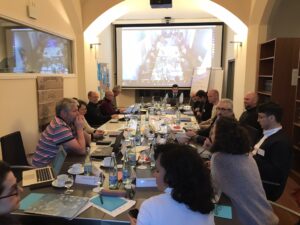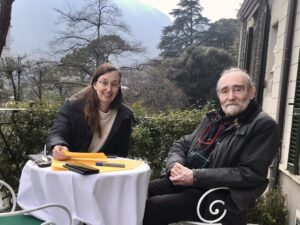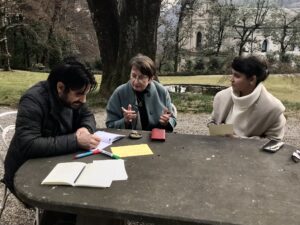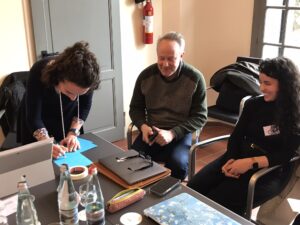How to Use AI, Machine Learning, Big Data and Digital Tools in Religious Studies
During the recent RESILIENCE workshop on "Religious Studies in the Digital Age", researchers from various disciplines discussed how the potential of Artificial Intelligence, machine learning, big data and digital tools can be used most effectively in Religious Studies.
Workshop
Twenty researchers from the fields of IT, Digital/Computational Humanities and various other disciplines such as Arabic studies, palaeography, linguistics, philosophy and church history gave keynote speeches to initiate discussions on how the potential of Artificial Intelligence, Machine Learning, Big Data and digital tools can be used most effectively in Religious Studies.
Epistemology of the Digital Religious Studies
The first day was dedicated to the epistemology of the Digital Religious Studies, aiming to open the workshop with fundamental questions such as the specific properties of data in this field and the different uses of physical primary sources and their digital representatives, technical, methodological and legal aspects of the use of digital data were explored.
Artificial Intelligence
The following day, the group explored the significance and potential of Artificial Intelligence (AI) as a tool or methodology for Religious Studies, and technological, philosophical and ethical implications coming out of the use of AI. The question of the possibilities and limits of standardisation and interoperability was repeatedly raised in view of the difficulty of (re)using data and results from different research projects for further research. It was noted that interoperability can and should be achievable with clearly defined application areas, scope and research questions as well as a common vocabulary, but that interoperability reaches its limits with increasing complexity of structures and is only possible at the expense of encoding depth and with the risk of losing semantic content.
The work on Religious Studies often involves multilingual texts, originating from different alphabets, which pose a particular challenge for interoperability, especially since terms of different meanings depending on the historical or regional context. In this framework, the implementation of a standard for cataloguing systems and in the TL/ML environment was discussed.




Requirements
The third day was characterised also by discussions on the requirements for an optimal digital scholarly edition of a historical text to explore how origins and textual change can be made visible by mapping stemmatological dependencies and textual variants, while providing a readable text that offers space and tools for user interpretation and functionalities that go far beyond those of printed (or digitised) editions. Such an exchange is already leading to further exploration between participants, in the framework of the ITSERR project.
Quality of Data
A transversal topic for the first three days was the quality of data: What are the standards for data that can be used effectively in research? Religious Studies deal with data in a historical context. Digital data can improve the research process, but data alone do not lead to research results. Moreover, participants elaborated on the difference between the information carrier in the form of the physical resource and the information carrying the meaning(s). Physical resources are still important for answering questions in religious studies that digital text data alone cannot convey. It was stressed how tools and data depend on the academic question, but, at the same time, those who create data need to abstract from the different types of research questions to envision relevant inputs.
Research Infrastructures
Finally, the last day was dedicated to the translation of the topics discussed in the workshop into the design and work of research infrastructures to ensure technological implementation as well as sustainability in the face of software lifecycle challenges. These issues were finally pointed to the use of a Research Infrastructure like RESILIENCE, and how it can answer the different user needs depending on the discipline, subject and research question.
Fruitful and Memorable
The combination of people, topics, and moderation techniques revealed to be of great success in terms of quality of the debates, enthusiasm in engaging into the discussions and scholarly exchange. The beautiful Villa Vigoni offered a great setting for this alchemy to be fruitful and memorable.
***
Prof. Dino Buzzetti
[Update April 25, 2023] We received the sad news that Prof. Dino Buzzetti, participant of the workshop and visible in the pictures above, passed away on Sunday, April 23. We will miss him, an erudite man with a warm personality, and are grateful for his foundational contributions to the field of Digital Humanities.
Workshop on “Religious Studies in the Digital Age”
The interdisciplinary workshop focusing on “Religious Studies in the Digital Age: Aligning Research Methodologies and National Strategies” was organised by members of the RESILIENCE consortium, Executive Director Francesca Cadeddu (FSCIRE) together with Marco Büchler and Alexandra Nusser (InfAI). The workshop took place from 27 February to 4 March 2023 at Lake Como in the Villa Vigoni, which is supported as “German-Italian Centre for European Dialogue” by the German Federal Ministry of Education and Research (BMBF) together with the Italian Ministry of Foreign Affairs and International Cooperation (MAECI). Together with the German Research Foundation (DFG), Villa Vigoni funds projects that strengthen German-Italian relations in the fields of research, education and culture in a European context.